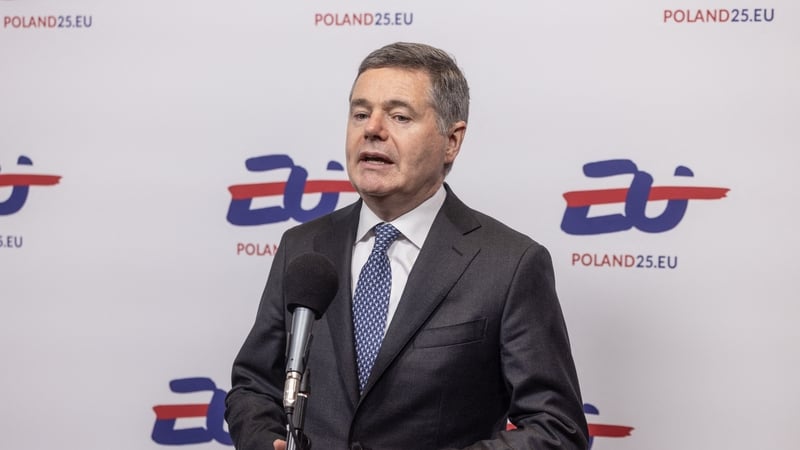European finance ministers have agreed on the “need for a unified stance” on US trade tariffs.
The statement came after a meeting of Eurozone and non-eurozone members in Warsaw.
Minister for Finance Paschal Donohoe – who is President of the Eurogroup – said they agreed on the “need for a unified stance and approach in response to the change that is under way”, a reference to the economic uncertainty unleashed by the Trump administration’s tariffs.
“We’re clear on where we stand within Europe. We remain united to a rules-based way of trading with each other,” Mr Donohoe said at a news conference.
On Wednesday, US President Donald Trump said that his administration would temporarily suspend targeted tariffs on other countries for 90 days to allow time for officials to negotiate with countries that have sought to reduce them.
European Commissioner for Economy Valdis Dombrovskis said the European Union welcomed the pause, saying the United States’ move “creates space for negotiations”.
A 10% blanket duty on almost all imports will remain in place, the White House confirmed.
The pace of the Trump administration’s U-turn on Wednesday clearly took economists at the European Commission by surprise as Mr Dombrovskis outlined estimates on the wider economic impact of Washington’s plan for a 20% tariff rate on EU imports.
The commission, he said, estimated that the effect of the move would reduce GDP (gross domestic product) in the US by 1.4% by 2027 and cause a 0.2% reduction in GDP across the EU during the same time period.
The longer-term impact of a permanent rate of 20%, Mr Dombrovskis added, would cause a reduction in US GDP of up to 3.6%, and up to 0.6% in the EU, while global trade would decline by 7.7% over the next three years.
“The imposition of tariffs will weaken the US economy by reducing consumers purchasing power, real wages and make important intermediate goods for production more expensive beyond the direct effects on tariffs,” he said.
“Europe did not start this confrontation, and Europe does not want this confrontation. Tariffs go against the political and economic logic of the deep and long-standing transatlantic trading partnership.”
Mr Dombrovskis added that the EU is ready to negotiate a mutually acceptable agreement with the US.
President of the European Central Bank Christine Lagarde said the bank is monitoring the situation and is “always ready to use the instruments” to ensure price and financial stability in the eurozone.
The EU has offered the US zero-for-zero tariffs on industrial goods and Commissioner for Trade Maroš Šefčovič will visit Washington on Sunday ahead of talks with US officials on Monday to reach a deal to resolve the tariffs’ dispute.
Trade between the US and EU was worth €1.6 trillion in 2023, making it the world’s largest trading partnership.
Read more:
China, EU must ‘jointly resist unilateral bullying’ – Xi
Tariff reprieve just a pause on a rollercoaster ride
Ten trading days that shook financial markets
US tariffs on Chinese imports were not spared by Mr Trump, with the US President saying he would raise the levy to 125%.
In response, China said that it will increase its tariffs on US imports from 84% to 125%.




